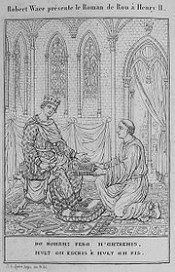wace

Wace (c. 1115 – c. 1183) was an Anglo-Norman poet, who was born in Jersey and brought up in mainland Normandy (he tells us in the Roman de Rou that he was taken as a child to Caen), ending his career as Canon of Bayeux. His extant works include: Roman de Brut (c. 1155) was based on the Historia Regum Britanniae of Geoffrey of Monmouth. It cannot be regarded as a history in any modern sense, although Wace often distinguishes between what he knows and what he does not know, or has been unable to find out. Wace narrates the founding of Britain, by Brutus of Troy, to the end of the legendary British history created by Geoffrey of Monmouth. The popularity of this work is explained by the new accessibility to a wider public of the Arthur legend in a vernacular language. In the midst of the Arthurian section of the text, Wace was the first to mention the legend of King Arthur's Round Table and the first to ascribe the name Excalibur to Arthur's sword, although he on the whole adds only minor details to Geoffrey's text. The Roman de Brut became the basis, in turn, for Layamon's Brut, an alliterative Middle English poem, and Piers Langtoft's Chronicle. Historian Matthew Bennett, in an article entitled "Wace and Warfare," has pointed out that Wace clearly had a good understanding of contemporary warfare, and that the details of military operations he invents to flesh out his accounts of pseudo-historical conflicts can therefore be of value in understanding the generalities of warfare in Wace's own time. His later work, the Roman de Rou, was, according to Layamon, commissioned by King Henry II of England. A large part of the Roman de Rou is devoted to William the Conqueror and the Norman Conquest. Wace's reference to oral tradition within his own family suggests that his account of the preparations for the Conquest and of the Battle of Hastings may have been reliant not only on documentary evidence but also on eyewitness testimony from close relations-- though no eyewitnesses would have been still alive when he began work on the text. The Roman de Rou also includes a mention of the appearance of Halley's Comet. The relative lack of popularity of the Roman de Rou may reflect the loss of interest in the history of the Duchy of Normandy following the incorporation of continental Normandy into the kingdom of France in 1204. The Anglo-Norman language Wace wrote in is variously regarded as a dialect of the Norman language, a dialect of Old French, or specifically the precursor of Jèrriais. Writers in Jersey have looked on Wace as the founder of Jersey literature, and Jèrriais is sometimes referred to as the language of Wace although the poet himself predated the development of Jèrriais as a literary language. Wace is the earliest known Jersey writer. Although the name Robert has been ascribed to Wace, this is a tradition resting on little evidence. It is generally believed nowadays that Wace only had one name. As a clerc lisant, he was proud of his title of Maistre (master) and is consequently sometimes referred to as Maistre Wace. It has been claimed that Wace's descriptions of militarily strategic points on the coast of Normandy were used in the early planning stages of the Battle of Normandy. There is a granite memorial stone to Wace built into the side of the States Building in Jersey's Royal Square. This includes a quote from the Roman de Rou that expresses the poet's pride in his place of birth: Modern French: English:
do you like this author?
What readers are saying
What do you think? Write your own comment on this book!
write a commentWhat readers are saying
What do you think? Write your own comment on this author!
write a commentBook list

La vie de Sainte Marguerite: poème inédit, précédé de l'histoire de ses transformations et suivi ...
Series:
Unknown
Year:
Unknown
Raiting:
3/5
Book digitized by Google from the library of the University of Michigan and uploaded to the Internet Archive by user tpb.
Show more
add to favoritesadd In favorites
Book list

La vie de Sainte Marguerite: poème inédit, précédé de l'histoire de ses transformations et suivi ...
Series:
Unknown
Year:
Unknown
Raiting:
3/5
Book digitized by Google from the library of the University of Michigan and uploaded to the Internet Archive by user tpb.
Show more
add to favoritesadd In favorites
What readers are saying
What do you think? Write your own comment on this author!
write a commentif you like wace try:
readers also enjoyed
What readers are saying
What do you think? Write your own comment on this author!
write a commentif you like wace try:
readers also enjoyed
Do you want to read a book that interests you? It’s EASY!
Create an account and send a request for reading to other users on the Webpage of the book!

